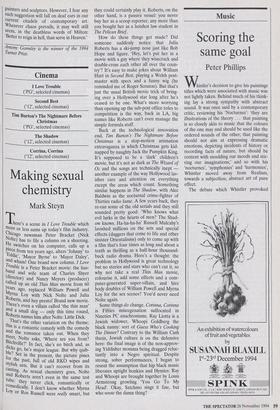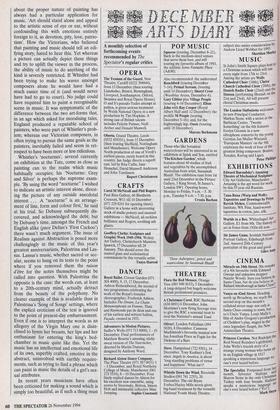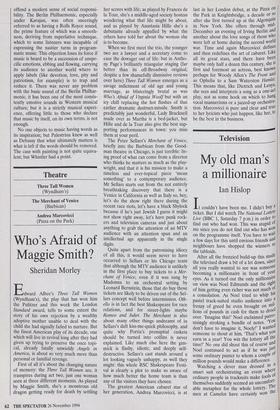Music
Scoring the same goal
Peter Phillips
Whistler's decision to give his paintings titles which were associated with music was not lightly taken. Behind much of his think- ing lay a strong sympathy with abstract sound. It was once said by a contemporary critic, reviewing his 'Nocturnes': 'they are illustrations of the theory .. . that painting is so closely akin to music that the colours of the one may and should be used like the ordered sounds of the other; that painting should not aim at expressing dramatic emotions, depicting incidents of history or recording facts of nature, but should be content with moulding our moods and stir- ring our imaginations;' and so with his `nocturnes', 'symphonies' and 'harmonies', Whistler moved away from Realism, towards a subjectless, abstract art of pure effect.
The debate which Whistler provoked about the proper nature of painting has always had a particular application for music. 'Art should stand alone and appeal to the artistic sense of eye or ear, without confounding this with emotions entirely foreign to it, as devotion, pity, love, patrio- tism'. How the Victorians, who believed that painting and music should tell an edi- fying story, hated to hear this. Yet whereas a picture can actually depict these things and try to uplift the viewer in the process, the ability of music to do anything of the kind is severely restricted. If Whistler had been trying to make his waves amongst composers alone he would have had a much easier time of it (and would never have had to go to court). No judge could have required him to paint a recognisable scene in music. It was symptomatic of the difference between the two art-forms that, in an age which asked for moralising tales, England produced a reputable school of painters, who were part of Whistler's prob- lem; whereas our Victorian composers, in often trying to pursue the same goals as the painters, inevitably failed and seem in ret- rospect to have been more or less ridiculous. Whistler's 'nocturnes', several currently on exhibition at the Tate, come as close as painting can to the realm which music habitually occupies; his 'Nocturne: Grey and Silver' is perhaps the supreme exam- ple. 'By using the word "nocturne" I wished to indicate an artistic interest alone, divest- ing the picture of any outside anecdotal interest .. . A "nocturne" is an arrange- ment of line, form and colour first,' he said at his trial. So Debussy subsequently dis- covered, and acknowledged the debt; but by Debussy's time, amongst the French and English alike (pace Delius's 'First Cuckoo') there wasn't much argument. The issue of Realism against Abstraction is posed more challengingly in the music of this year's greatest anniversarians, Palestrina and Las- sus. Lassus's music, whether sacred or sec- ular, seems to hang on its texts to the point where if you removed them the raison d'être for the notes themselves might be called into question. With Palestrina the opposite is the case: the words can, at least to a 20th-century mind, actually detract from the beauty of the polyphony. No clearer example of this is available than in Palestrina's 'Song of Songs' settings, where the explicit eroticism of the text is ignored to the point of present-day embarrassment. Even if one is to interpret the words as an allegory of the Virgin Mary one is disin- clined to hymn her breasts, her lips and her enthusiasm for entering the king's bed- chamber in music quite like this. Yet the music has an intellectual and emotional life of its own, superbly crafted, emotive in the abstract, uninvolved with earthly require- ments, such as trying to find a phrase which can paint in music the details of a girl's sex- ual attributes.
In recent years musicians have often been criticised for making a sound which is simply too beautiful, as if such a thing must offend a modern sense of social responsi- bility. The Berlin Philharmonic, especially under Karajan, was often sneeringly referred to as having a Rolls Royce sound, the prime feature of which was a smooth- ness, deriving from superlative technique, which to some listeners was incapable of expressing the nastier turns in program- matic music. This objection loses its force if music is heard to be a succession of unspe- cific emotions, ebbing and flowing, carrying its audience to another world where to apply labels (like devotion, love, pity and patriotism, for example) is to trap and reduce it. There was never any problem with the basic sound of the Berlin Philhar- monic, it has been one of the most consis- tently emotive sounds in Western musical culture; but it is a strictly musical experi- ence, offering little to those who declare that music by itself, on its own terms, is not enough.
No one objects to music having words as its inspiration; but Palestrina knew as well as Debussy that what ultimately matters is what is left if the words should be removed. The case with painting is not quite equiva- lent; but Whistler had a point.












































































 Previous page
Previous page